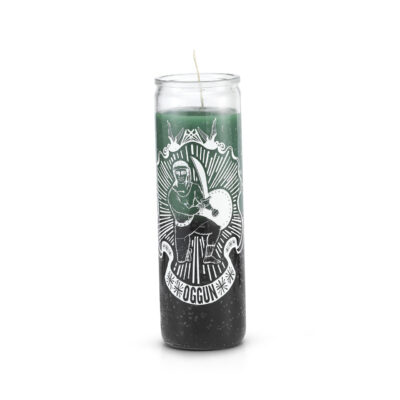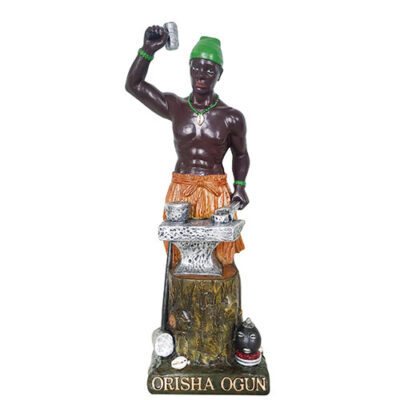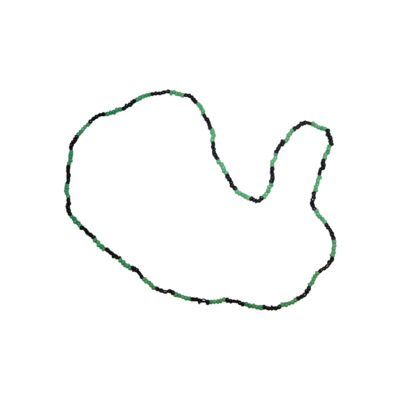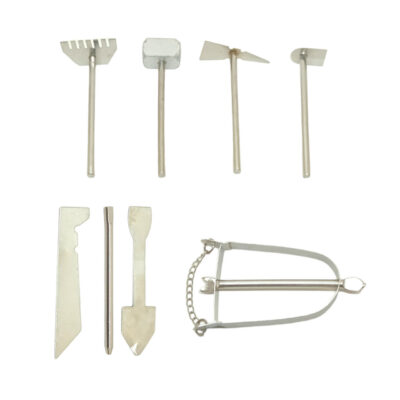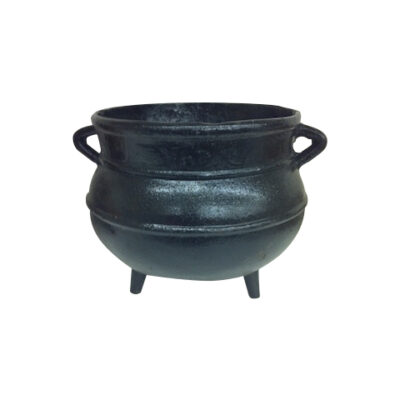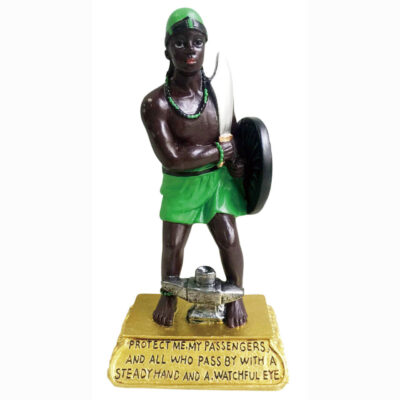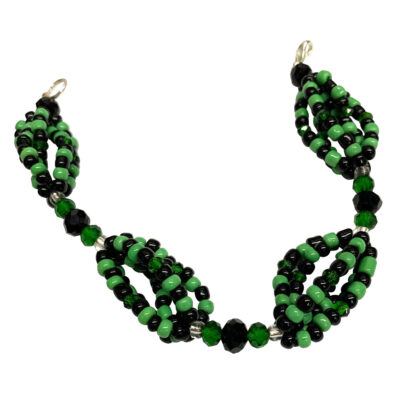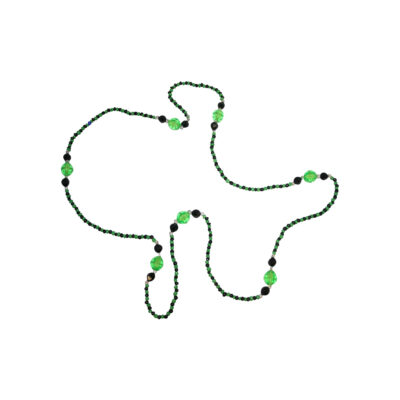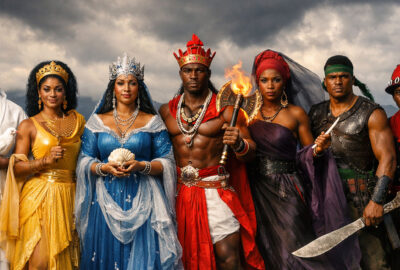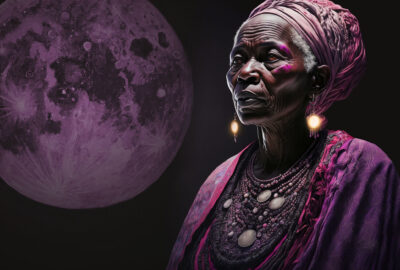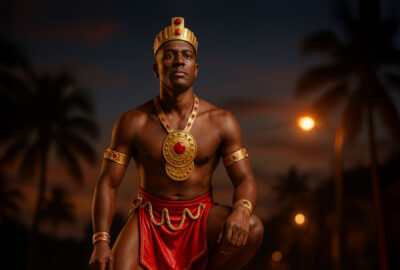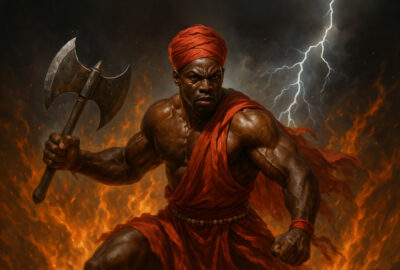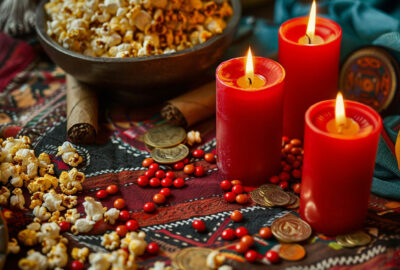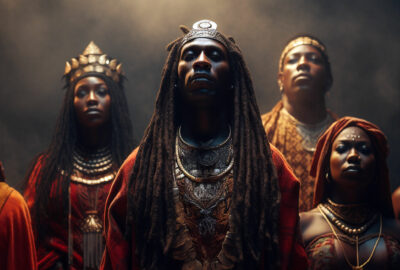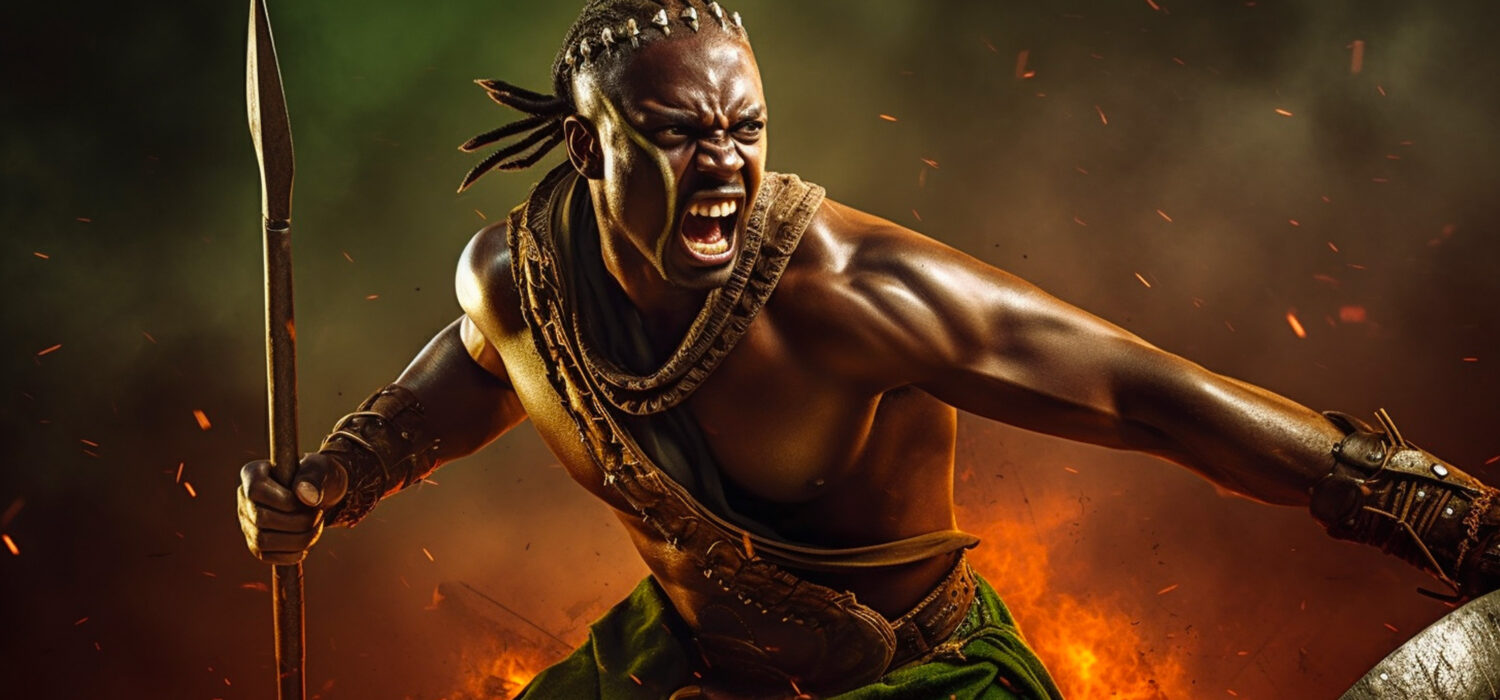
Ogun: Orisha of Iron, War, and Unyielding Strength
Ogun is one of the most powerful and revered Orishas in the Yoruba religion and its diaspora traditions, such as Santeria and Candomblé. Known as the master of iron and fire, Ogun is a fierce warrior, protector of truth and justice, and patron of those who forge, cut, heal, or build with metal. His energy is raw and unstoppable, clearing paths, removing obstacles, and defending those under his care.
Origins and Mythology of Ogun
In Yoruba cosmology, Ogun is among the oldest Orishas and is called Osin Imole, meaning "first of the primordial Orishas to come to Earth." Legends say he descended to prepare the world for human life, shaping civilization with his tools of iron.
One story tells that after Obatala’s death, Ogun sought to claim the throne but was exiled by Obamakin. This exile is commemorated in the Olojo Festival, an ancient celebration that honors the Black race and Ogun’s enduring power. His place among the Seven African Powers underscores his central role in Yoruba spirituality.
Ogun is the divine patron of blacksmiths, butchers, surgeons, and all who work with blades or iron tools. His nature mirrors the strength of the metals he governs—unyielding, direct, and incorruptible. In Yoruba courts, truth is sworn upon a sacred machete dedicated to Ogun, underscoring his authority as the god of justice.
Appearance and Symbolism
Traditionally, Ogun is depicted as a tall, muscular man, often wearing a raffia skirt. His skin is painted black, representing his connection to iron. He carries weapons and tools such as machetes, hammers, or bows and arrows. In Santeria, Ogun is often syncretized with Catholic saints such as Saint Peter or Saint George, combining African spiritual imagery with colonial influences.
Ogun’s colors are red, black, and green: symbols of vitality, strength, and protection. In some regions, like Bahia and Rio de Janeiro, he is associated with marine blue. His sacred number is seven, which carries strong spiritual significance in Yoruba traditions.
The Sacred Tools of Ogun
Ogun’s tools are more than symbols; they are embodiments of his energy:
- Anvil: The foundation of transformation, symbolizing how the earth and iron shape humanity.
- Cauldron: A womb, mine, or abyss holding untapped potential.
- Machete: Clears paths and cuts away obstacles.
- Rake: Smooths rough terrain within the self.
- Hoe: Cultivates one’s potential and spiritual growth.
- Pick: Breaks through hardened challenges.
Each of these tools is kept together, often in a ritual cauldron, representing the unity of Ogun’s powers.
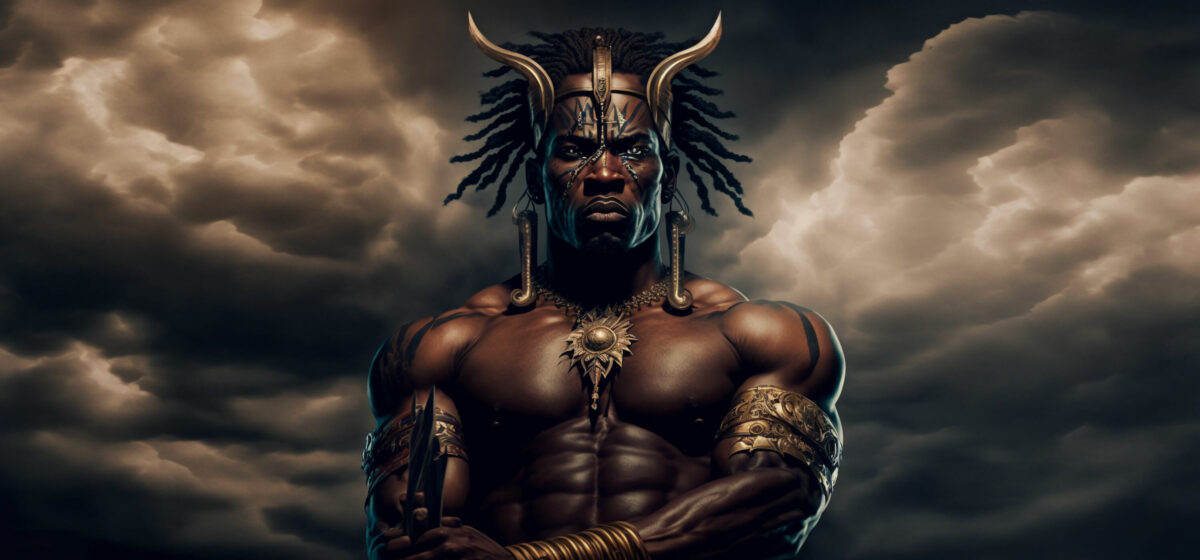
In some myths, Ogun is portrayed as a rival or an enemy of other Orishas.
Ogun’s Relationships with Other Orishas
Ogun’s relationships with other Orishas are layered and sometimes tense. In some myths, he is at odds with Obatala. In others, he works closely with Orula, the Orisha of divination, seeking wisdom before acting. In Santeria, Ogun often appears alongside Elegua, the opener of roads, and Oshun, the goddess of love and fertility, reflecting his role in clearing the way for blessings.
Ogun’s Wives: Oya and Olure
Ogun’s most famous union was with Oya, the Orisha of winds and storms. Together, they represented a balance between unstoppable force and uncontainable change. Myths also tell of Olure, a goddess created for Ogun who ultimately rejected him, an example of the divine complexity in Yoruba storytelling.
Tales of Ogun’s Might and Determination
Throughout Yoruba oral tradition, Ogun’s courage, skill, and fierce sense of justice have been celebrated in story after story. These tales are more than entertainment; they carry the values, warnings, and inspiration of the culture he protects. Here are three legendary episodes that reveal different sides of Ogun’s power.
Ogun and the Stolen Sun
Long ago, the people awoke to find the world plunged into darkness. The sun had vanished from the sky. Fear spread through the villages, for without the sun’s warmth, the earth would wither. The Orishas gathered, and it was Ogun who stepped forward, promising to find and restore the light.
He journeyed deep into the forests, where the air was thick and the ground tangled with roots. Along the way, a giant bird blocked his path, its wings casting shadows like storm clouds. The bird attacked, but Ogun’s machete flashed in the gloom, and with strength born of iron itself, he defeated it.
Pressing on, he discovered the culprits: mischievous spirits who had stolen the sun and hidden it in a woven basket. With his unmatched skill in battle, Ogun drove them away and freed the sun, lifting it high so that light and warmth once again touched the earth. To this day, the story is told as a reminder that Ogun clears even the darkest paths.
Ogun and the Palm Wine Tapper
In another tale, Ogun encountered a palm wine tapper trapped high in a palm tree by a sly spirit. The man called for help, and Ogun, always the protector, came to his rescue. In gratitude, the tapper offered Ogun fresh palm wine. Ogun drank deeply, but the wine was strong and intoxicating. Soon, his mighty energy turned into an uncontrollable fury. He roared, swung his machete, and cut down anything in his path. The villages trembled as he rampaged, unable to stop.
Realizing the destruction he had caused, Ogun was filled with shame. He sought guidance from the other Orishas, who worked to cleanse him of the drunken rage clouding his spirit. The lesson was clear: even the strongest warrior must guard against losing control, for unchecked power can harm as much as it protects.
Ogun and the Sacred Iroko Tree
One of the most revered stories tells of a sacred Iroko tree, ancient and immense, said to be the dwelling of powerful spirits. A band of hunters, driven by greed, sought to cut it down. Ogun, knowing the tree’s sacredness, vowed to protect it. Again and again, he fought off the hunters, his iron weapons flashing in the sunlight, his body unyielding.
But the hunters kept returning, undeterred. At last, Ogun made the ultimate choice: he transformed himself into the Iroko tree, merging his spirit with its ancient roots. The hunters could no longer harm it, and the tree became a living symbol of Ogun’s eternal guardianship. Even now, the Iroko is honored as a sacred protector, a reminder of Ogun’s willingness to give of himself for the greater good.
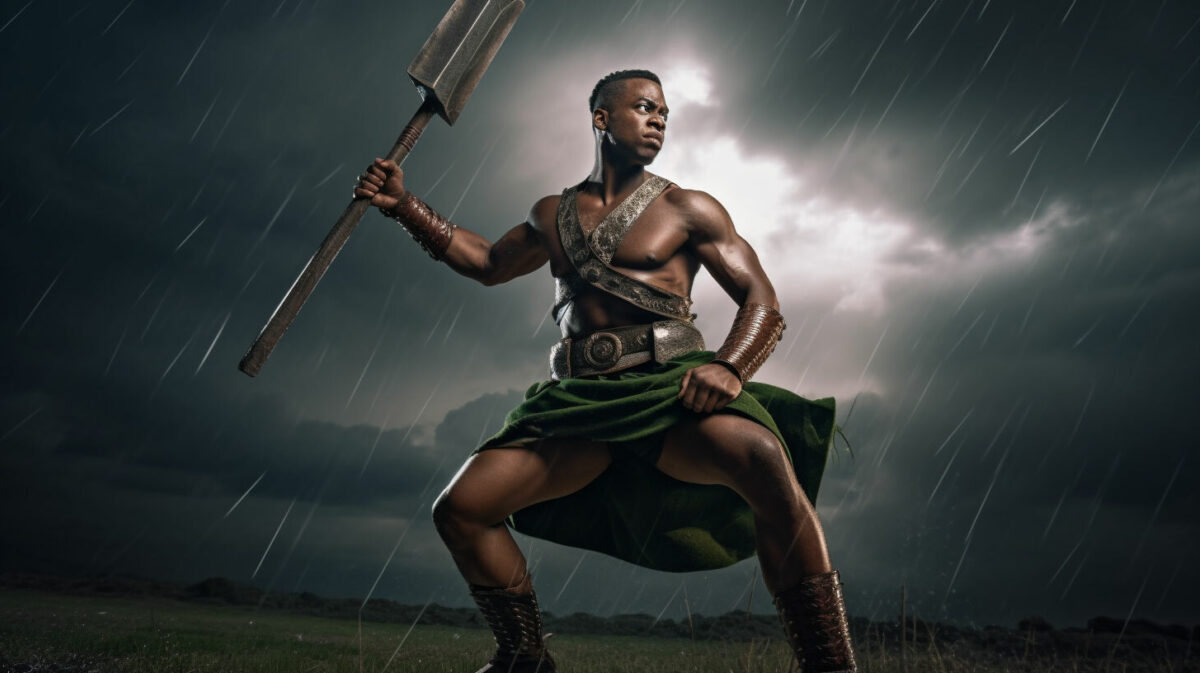
Ogun has become a symbol of resistance and resilience in African and African American culture.
Ogun as a Symbol of Resistance and Resilience
In African and African American history, Ogun represents courage against oppression and the ability to endure hardship. His machete and hammer are both weapons and tools for building a better future. Movements for justice and liberation have invoked Ogun’s spirit to inspire strength, determination, and unity.
How Ogun is Worshiped
Devotees honor Ogun through offerings of rum, cigars, roasted yams, and iron objects. Altars often feature his tools and colors, similar to those described in creating an Orisha altar. Rituals may be performed to clear paths, remove obstacles, or protect against enemies.
Prayers to the Orisha Ogun
Practitioners in the Yoruba, Santeria, and Voodoo faiths will petition the Orisha Ogun for protection from their enemies, to find employment, or to clear any obstacles that may be preventing their spiritual growth.
Ogun Prayer To Clear Your Path
Light a 7 Day Ogun candle to Ogun to remove spiritual and material obstacles from your path. The following prayer can help connect with this powerful Orisha:
Warrior Orisha Ogun
Protect us from tragedies and accidents.
Protect us from all evil and harm.
Do not permit the iron to hurt us.
Be the one in charge Ogun to guard, and protect us,
And that we have peace.
Ogun Prayer For Protection
For this prayer, you can also light a 7 Day Ogun candle to protect yourself from dark magic being used to influence you or to become invisible to your enemies. For Ogun's powerful protection, say the following prayer:
Ogun bless me with protection
Of your shield, sword, and divine light
So all enemies retreat in fear
Ogun bless me with refuge inside your light
By your powers, I am removed from my enemies' sight
Ogun Prayer For Employment
Start by lighting a 7 Day Ogun candle to help you find a job, get a raise, or draw in more money from your business. Recite the following prayer to obtain Ogun's blessings:
Ogun bless me with fortune
To do more than I was destined
For the good of myself and others
Ogun provide me with opportunity
To multiply and grow
For the benefit of all
Remember, when you are praying to Ogun or any of the Orishas, keep your mind focused clearly on your intentions. Visualize the energy that is being manifested by the prayer you are speaking, and feel the Orisha flowing through your heart, mind, and soul. Be open and ready to receive the many blessings that Ogun will bestow upon you.
FAQs About Ogun
Can Ogun be petitioned for legal matters or court cases?
Yes. Many practitioners call upon Ogun when seeking justice or fairness in legal disputes. His association with truth, order, and the removal of obstacles makes him a powerful ally in court-related rituals.
Is Ogun connected to any planets or astrological signs?
While not traditionally tied to Western astrology, some modern practitioners associate Ogun with Mars for his warrior energy and iron connection, and with Saturn for his discipline and structure.
Are there specific days or times considered best for honoring Ogun?
In many traditions, Tuesdays are sacred to Ogun due to their martial energy. Early morning offerings, especially at sunrise, are believed to be particularly potent.
How do you dispose of offerings made to Ogun?
Offerings are often left at crossroads, train tracks, or places where iron and industry are present. Some practitioners also return offerings to nature, burying them respectfully or leaving them at the base of a sturdy tree.
Can Ogun be honored alongside other warrior spirits or deities?
Yes, but practitioners generally keep offerings and altars separate to maintain respect for each spirit’s unique energy. Ogun is often honored alongside Elegua and Ochosi, especially in path-opening and protection work.
What foods or drinks does Ogun favor?
Ogun is traditionally offered rum, red palm oil, roasted yams, and meats. In some Afro-Caribbean practices, he also receives strong coffee and cigars.
Does Ogun punish those who lie under his oath?
Yes. In Yoruba tradition, swearing falsely on Ogun’s name, often by kissing his sacred iron, is believed to invite his swift and often severe retribution.
Is Ogun ever invoked for creative or artistic pursuits?
While best known for his warrior and protective aspects, Ogun also governs invention and creation. Artists, engineers, and builders sometimes petition him for inspiration and skill.
How can beginners respectfully start a relationship with Ogun?
Start with a simple offering of a small piece of iron, a red candle, and fresh water. Speak sincerely, introducing yourself and explaining your intentions. Consistency and honesty are key in earning his trust.
Ogun’s Enduring Power in the Modern World
Ogun’s legacy is not confined to the myths of the past. His strength, wisdom, and unyielding spirit remain deeply relevant today. For those who seek courage to face life’s battles, clarity to make hard decisions, or resilience in the face of injustice, Ogun’s energy offers a guiding light. Whether through prayer, ritual, or simple daily offerings, honoring Ogun is a way of aligning with determination, integrity, and purposeful action.
As a warrior, blacksmith, and protector, Ogun teaches that challenges are not barriers, but opportunities to forge something stronger. By embracing his lessons, we invite not only his protection but also the tools to shape our destiny.
